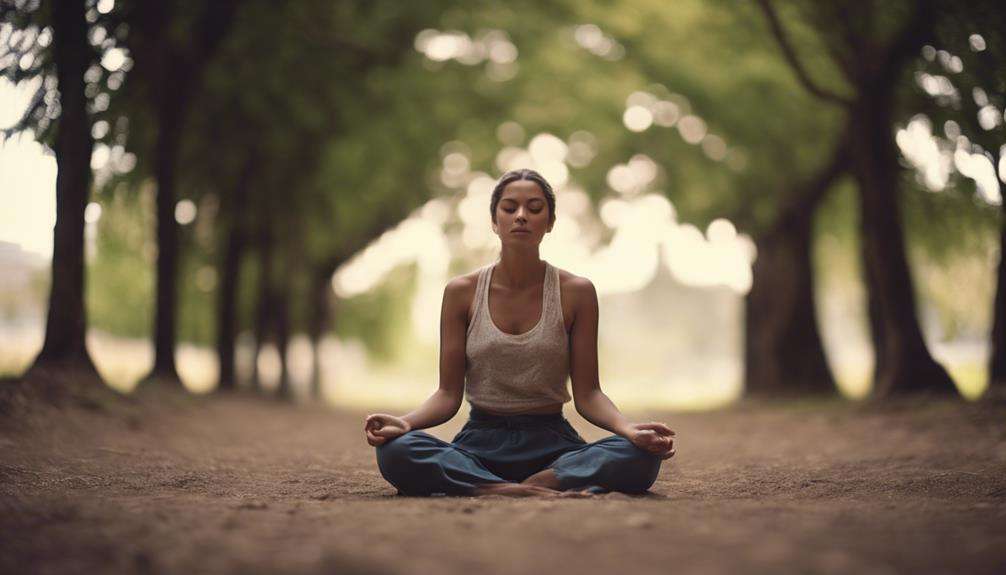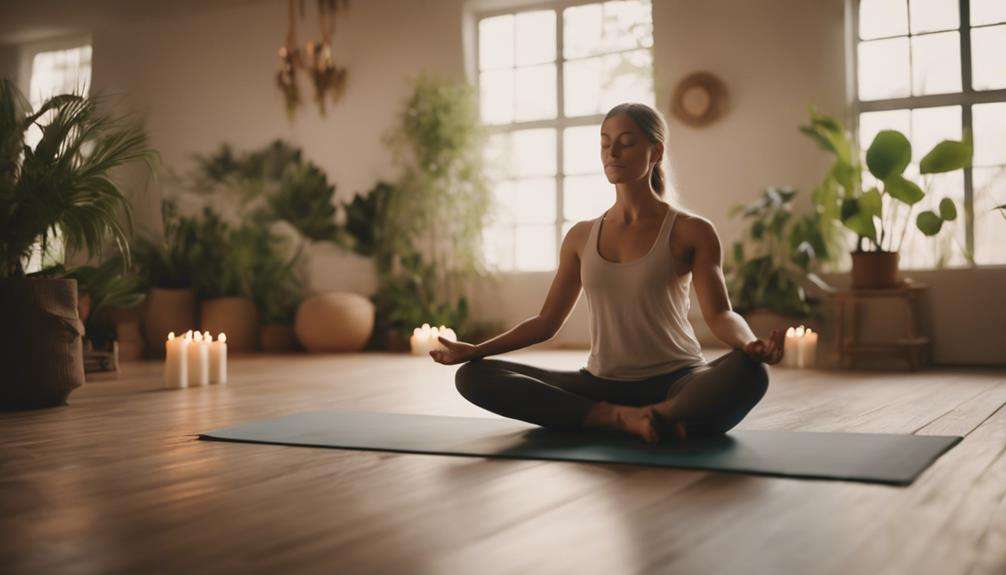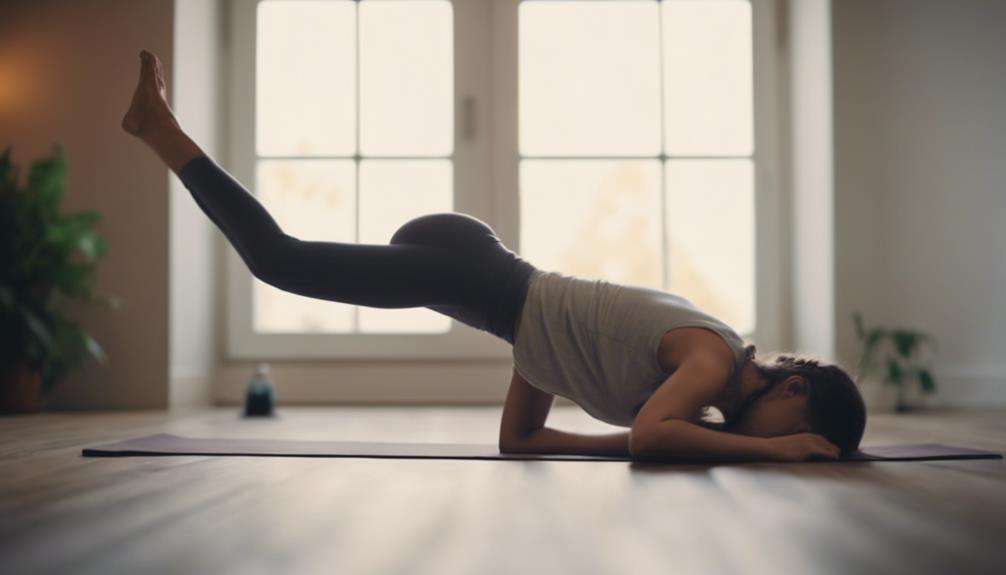Imagine yourself standing barefoot on soft, cool grass, feeling the earth beneath your feet grounding you. This simple yet powerful technique is just the beginning of a journey towards stress relief.
As you explore the top grounding techniques available, you'll discover practical methods that can help you find peace amidst chaos. From sensory experiences to mindful practices, each technique offers a unique way to anchor yourself in the present moment and ease your mind.
Discover how these techniques can transform your approach to managing stress and enhancing your overall well-being.
Key Takeaways
- Engage in tactile activities to ground yourself and reduce stress.
- Connect with nature for relaxation and mood enhancement.
- Use sensory techniques like scent and touch for immediate relief.
- Practice mindfulness to stay present and calm amidst stress.
Hands in Water
If you're seeking a quick and effective way to ground yourself and alleviate stress, consider immersing your hands in water. The physical act of feeling the temperature and sensation of the water can be remarkably grounding. By focusing on the coolness or warmth of the water against your skin, you divert your attention from anxious thoughts and bring yourself into the present moment. This sensory experience not only distracts your mind but also helps reduce stress and increase mindfulness.
The calming effect of water on your hands can regulate your emotions swiftly. It's a simple yet powerful technique that can soothe and refresh your mind. Engaging with water in this way is a popular choice for grounding exercises due to its immediate impact on your overall well-being. Next time you feel overwhelmed, take a moment to connect with the water, let its sensations guide you to a place of calmness and peace.
Touch Nearby Items
When you touch nearby items, you engage your sense of touch, which can help bring you back to the present moment.
By feeling the textures and weights of objects around you, you can distract your mind from stress and find comfort in the physical sensations.
This simple act can have a calming effect on your nervous system, allowing you to focus on the present and promote relaxation.
Use Tactile Objects
Engaging with tactile objects around you can provide a grounding sensation that helps shift your focus away from stress and into the present moment. By exploring the texture and color of nearby items through touch, you immerse yourself in the physical sensations, effectively reducing anxiety.
This tactile grounding technique offers a quick and efficient way to calm down and center yourself during moments of stress. Feeling the textures of objects not only anchors you in the present but also fosters a tangible connection to your environment, promoting relaxation and mindfulness.
Next time you feel overwhelmed, take a moment to touch and feel the objects around you, allowing yourself to experience the calming effects of tactile engagement.
Grounding Through Touch
Immerse yourself in the present moment by actively feeling the textures, temperatures, and weights of nearby items as a grounding technique through touch.
Engaging in tactile sensations can provide a distraction from overwhelming thoughts and emotions, bringing your focus back to the now. By exploring different textures and shapes, you stimulate your sense of touch, which can have a calming effect on your mind.
The physical act of touching items nearby not only grounds you but also fosters a sense of stability and connection to your surroundings. Use touch as a tool to center yourself, anchoring your awareness in the present moment.
Let the tactile experience guide you towards a place of peace and calm amidst chaos.
Deep Breathing

Are you looking for a simple and effective way to reduce stress and promote relaxation?
Deep breathing is a powerful technique that can help you achieve just that.
Breath Awareness Benefits
Deep breathing is a powerful technique that can effectively enhance oxygen flow, promote relaxation, and reduce stress levels. When you engage in deep breath awareness, you're allowing your body to regulate the autonomic nervous system, leading to a calmer state of mind. This practice can also lower your heart rate and blood pressure, aiding in stress relief.
Moreover, by incorporating deep breathing into your routine, you can improve your focus, concentration, and overall mental clarity. Remember, regular practice of deep breathing contributes not only to stress relief but also to better emotional well-being and resilience. Embrace the benefits of deep breathing as a tool for enhancing your overall wellness.
Techniques for Relaxation
Embracing relaxation techniques such as deep breathing can significantly aid in reducing stress and promoting a sense of calm and well-being. Deep breathing involves taking slow, deep breaths to activate the body's relaxation response, which effectively lowers heart rate and blood pressure. This technique not only reduces anxiety but also improves oxygen flow, enhancing overall relaxation.
By practicing deep breathing regularly, you can cultivate mindfulness and improve your mental health. The simplicity and accessibility of deep breathing make it a convenient tool for stress management, as it can be done anytime and anywhere.
Incorporating deep breathing into your daily routine can have profound effects on your well-being, helping you navigate through life's challenges with a greater sense of peace.
Savor Food or Drink
To enhance your stress relief experience, consider incorporating the soothing practice of savoring food or drink into your daily routine. Savoring food or drink involves taking small, mindful bites or sips to fully appreciate flavors and textures. This technique helps in grounding by focusing on the present moment and engaging the sense of taste.
Paying attention to the sensations of eating or drinking can distract from anxious thoughts and promote relaxation. It can be done with any food or beverage, allowing for a quick and accessible way to practice grounding. Savoring food or drink is a simple yet effective grounding technique that can be easily integrated into your daily life for stress relief.
Short Walk

When you take a short walk, you allow nature's calming influence to wash over you.
By focusing on your mindful steps, you create a space for relaxation and peace in your mind.
Nature's Calming Influence
Connecting with nature through a short walk outdoors can significantly reduce stress and anxiety, fostering a sense of calmness and rejuvenation. When you step outside and immerse yourself in green spaces, you allow nature to work its magic on your well-being. Here are four reasons why a simple walk in nature can have a profound calming influence on your mind and body:
- Enhanced Mood: Walking in green spaces has been scientifically proven to elevate mood and reduce cortisol levels.
- Promotes Relaxation: The sights, sounds, and smells of nature during a walk promote relaxation and mental clarity.
- Boosts Endorphins: Physical activity like walking releases endorphins, natural mood-boosting chemicals.
- Circulation and Oxygenation: A brisk walk stimulates circulation, oxygenates the body, and promotes a sense of calmness and rejuvenation.
Mindful Steps for Relaxation
As you take mindful steps during a short walk, you can actively engage in grounding techniques that promote relaxation and mental clarity. This simple act of physical movement can help shift your focus away from stressors, allowing you to be present in the moment.
Walking outdoors during your short stroll provides sensory stimulation through the natural sights, sounds, and fresh air that surround you, further enhancing the relaxation effect. The rhythm of your steps and the release of endorphins as you walk contribute to reducing stress and improving your mood.
Hold Ice
Feeling overwhelmed or anxious? Holding ice in your hand can provide instant relief by grounding you in the present moment. The cold sensation of ice can be a powerful tool for disrupting overwhelming thoughts and bringing your focus back to the now. Here are some reasons why holding ice can be an effective grounding technique for stress relief:
- Physical Distraction: The feeling of cold ice in your hand creates a physical sensation that diverts your attention away from anxiety or stress.
- Sensory Impact: Ice offers an immediate and intense sensory experience, helping to anchor you in the present moment and away from emotional distress.
- Quick Relief: The shock of cold from ice can stimulate both your body and mind, providing rapid relief from overwhelming feelings.
- Discreet Use: Ice is a discreet tool that can be used in various settings, making it a convenient option for quick grounding and stress relief.
Try holding ice in your hand the next time you feel anxious or stressed to experience the benefits of this simple yet effective technique.
Savor Scent

Savoring scents can be a transformative practice that enhances your well-being and promotes relaxation by triggering positive emotions and memories. Aromatherapy, utilizing essential oils or scented candles, can create a calming atmosphere that helps reduce stress levels.
The sense of smell plays a crucial role in how scents can positively impact your mood and overall mental state. Inhaling soothing aromas like lavender, chamomile, or citrus can alleviate anxiety and uplift your spirits. Different scents have diverse effects; some may boost focus and alertness, while others induce tranquility and aid in better sleep.
Engaging with pleasant scents is a simple yet powerful grounding technique that can bring instant relief during stressful moments. By incorporating the practice of savoring scents into your routine, you can tap into the benefits of aromatherapy, fostering positive emotions and promoting relaxation through the sense of smell.
Move Your Body
Engaging in physical movement can significantly contribute to reducing stress levels and promoting relaxation by releasing endorphins and improving cognitive function. When you move your body through exercise, you aren't only benefiting your physical health but also nurturing your mind and body connection.
Here are four reasons why incorporating physical activity into your routine can be a powerful grounding technique for stress relief:
- Endorphin Release: Exercise triggers the release of endorphins, your body's natural mood lifters, helping to reduce stress and promote a sense of well-being.
- Improved Cognitive Function: Physical activity increases blood flow and oxygen to the brain, enhancing cognitive function and boosting your mood.
- Distraction from Negative Thoughts: Moving your body can shift your focus away from worries and anxieties, allowing you to be present in the moment.
- Enhanced Mental Well-being: Regular exercise has been linked to lower levels of anxiety and depression, contributing to an overall improvement in mental health.
Listen to Surroundings

Listening to your surroundings can serve as a powerful grounding technique to help you stay present and reduce feelings of anxiety. When you tune in to the auditory stimuli in your environment, such as the rustling of leaves, distant conversations, or the hum of appliances, you can create a sense of connection to the present moment. By actively engaging with the sounds around you, you divert your attention from internal worries and immerse yourself in the external world, promoting relaxation.
The act of listening to your surroundings not only distracts you from distressing thoughts but also enhances your awareness of the present moment. Whether you're sitting in a bustling cafe or taking a walk in nature, the sounds that surround you can anchor you in the now. This practice fosters a deeper connection to your environment, allowing you to find solace in the simplicity of just being and offering a moment of respite from stress. So, next time you feel overwhelmed, take a moment to listen to the world around you and let it guide you back to a place of peace and calm.
Feel Your Body
To ground yourself in the present moment, focus on the physical sensations of your body. By tuning into your body sensations, you can enhance awareness and mindfulness, which are essential for stress relief and anxiety reduction.
Here are four ways feeling your body can help you navigate through stressful times:
- Heightened Awareness: Paying attention to the physical cues your body gives off can help you better understand how stress impacts you.
- Mindful Response: Being in tune with your body sensations allows you to respond to stressors in a more mindful and controlled manner.
- Relaxation Promotion: Recognizing changes in muscle tension, breathing patterns, and heart rate can guide you in implementing relaxation techniques effectively.
- Present Moment Focus: Feeling your body brings your focus back to the present moment, helping you let go of worries about the past or future and find peace in the now.
Practice feeling your body regularly to build resilience and cope with stress more effectively.
Frequently Asked Questions
How Does the 5 4 3 2 1 Grounding Technique Work?
To engage in the 5-4-3-2-1 grounding technique, focus on sensory awareness. See 5 things, feel 4 objects, hear 3 sounds, smell 2 scents, taste 1 thing. This practice enhances mental focus, calming breath, body scan, and relaxation response for stress reduction and emotional regulation.
What Is the 5 5 5 Grounding Technique?
When you practice the 5-5-5 grounding technique, you identify 5 things you see, hear, and feel around you. This simple exercise shifts your focus, calms you down, and helps reduce stress effectively.
What Is the Grounding Trick for Anxiety?
When you're anxious, try the grounding trick. Engage your senses through deep breathing, mindful walking, visualization, progressive muscle relaxation, positive affirmations, guided meditation, body scan, nature connection, and sensory grounding. Stay present and calm.
Does Grounding Help With Stress?
Feeling overwhelmed? Grounding indeed helps with stress by enhancing the mind-body connection. Engage in sensory awareness through nature therapy for emotional regulation. Practice self-soothing techniques for stress reduction; gain mental clarity and relaxation. You've got this!
Conclusion
As you practice these grounding techniques, imagine yourself as a tree firmly rooted in the earth, swaying gently in the breeze but never swaying from your core.
Feel the waves of stress and anxiety wash away, leaving you grounded, strong, and resilient.
Keep nurturing your roots with these tools, and watch yourself grow taller and stronger in the face of life's storms.
You've got this. Stay rooted, stay strong.






